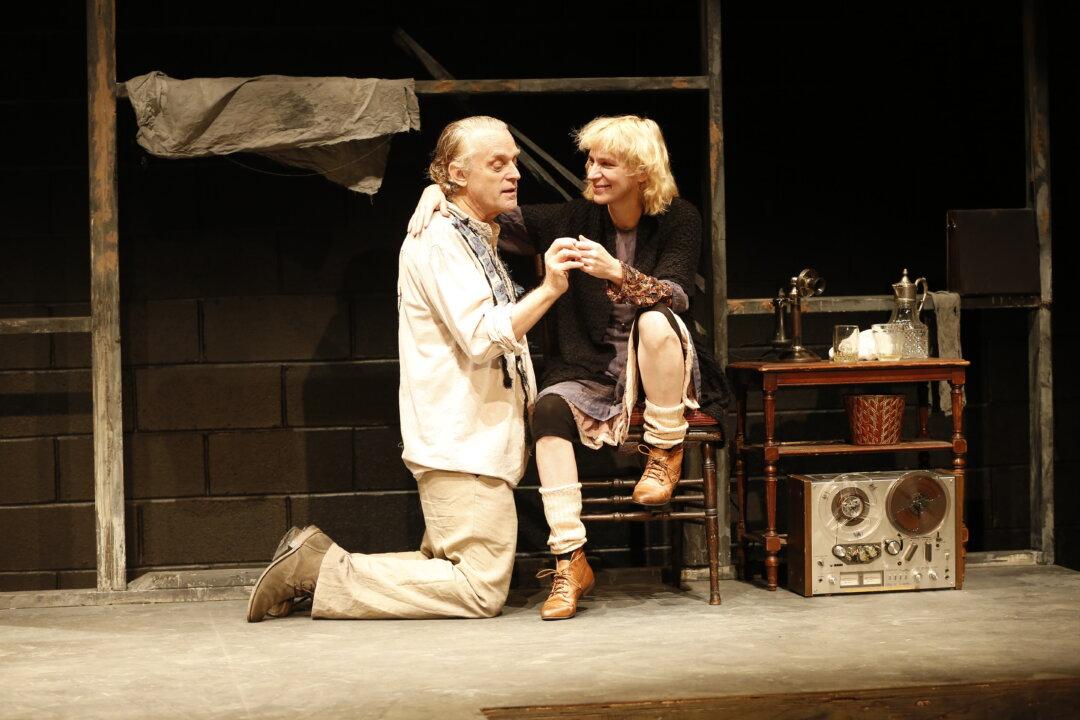NEW YORK—Tennessee Williams peers at the psyches of the lonely, damaged, and possibly insane with his rarely performed work “The Two-Character Play.”
Brother and sister acting team Felice (Brad Dourif) and Clare (Amanda Plummer), apparently the heads of a company of touring actors, arrive at their latest performance venue to find the entire backstage area deserted and the set only half-erected.
It seems the rest of the company, not having been paid for a while and believing the two siblings to be totally insane, have deserted them; they leave the two to carry on alone, with the audience about to enter for that evening’s show.
While Clare, seemingly the more fragile of the two, wants to leave the theater immediately, Felice refuses to hear of it, insisting they must give that night’s performance by themselves. (The show is “The Two-Character Play,” a piece Felice himself has written and one that Clare doesn’t think much of.)
Clare eventually agrees to perform, but warns Felice to be aware that she may suddenly skip certain sections of the play or go off on unexpected improvisational tangents whenever the mood strikes her.
In short order, Felice and Clare begin the play, which is set in the small Southern town of New Bethesda. New Bethesda is a place where everybody knows everyone else’s business and where Felice and Claire—playing brother and sister—live in an old and somewhat decaying residence.
The two have been ostracized by the townspeople and forced to become virtual recluses due to a scandal regarding their parents’ death some time before.
Now living on faded memories and half-forgotten dreams, Clare’s character has become a complete agoraphobic, frightened of her own shadow; while Felice’s character, the more straightforward of the two, continues to believe in the need to put up a brave front, so as not to let anyone see his pain and fear.
However, the question soon becomes just how much of what is being presented is real and how much is imaginary, as the line between the play and the play within the play quickly blurs.
Felice and Clare react passionately and violently to certain situations in which the other is in control of the narrative, as if they are afraid to venture into the territory that their sibling is taking them. This tactic may have been Williams’s intention all along—that of forcing one to truly face the past, in one form or another.
Definitely a personal work, this play forces the audience to really think. While all the classic elements of a Tennessee Williams offering are present, (such as faded Southern gentility, family secrets, and fleeting ghostly images of what may or may not have happened), it’s up to the audience to figure out the meaning of the piece and where the truth can be found in it all.
If the audience is expecting the story to be set up in advance for them, they’re bound to be disappointed. If however, they’re willing to follow the actors and try to understand the story, they should find it quite illuminating.
Both Dourif and Plummer do a great job in bringing to life these two tormented individuals. The characters alternatively hate and need each other, reacting to both extremes with an almost vitriolic passion.
Plummer is wonderful as perennially frightened Clare, a person who has a hidden persona—one alternately clingy, powerful, and just a bit malevolent.
Dourif is excellent as the outwardly controlling, inwardly desperate Felice. He is a man determined to put on a confident air, as if trying to believe that this mask will allow him to glide through various troubles.
Both actors play off each other quite well. They show the years of familiarity their characters have had with one another, coupled with the resigned exhaustion of fighting what has become an endless battle for control of whatever situation they find themselves in.
Gene David Kirk’s direction is quite good, confidently guiding the action as the show effortlessly jumps from one setting to another. It allows the actors to seemingly take the story in whichever direction they choose.
Alice Walkling’s set of the unfinished theater set is excellent, and the costumes by Lara de Bruijn fit well with the characters’ situations.
Well-acted and presented, “The Two-Character Play” merges illusion with reality. At the same time, it offers a look at two very troubled individuals caught between those two extremes with an end result that is intellectually stimulating.
“The Two-Character Play”
New World Stages
340 West 50th Street
Tickets: 212-239-6200 or visit www.telecharge.com
Running Time: 2 hours
Closes: Sept. 1
Judd Hollander is the New York correspondent for the London publication The Stage.





